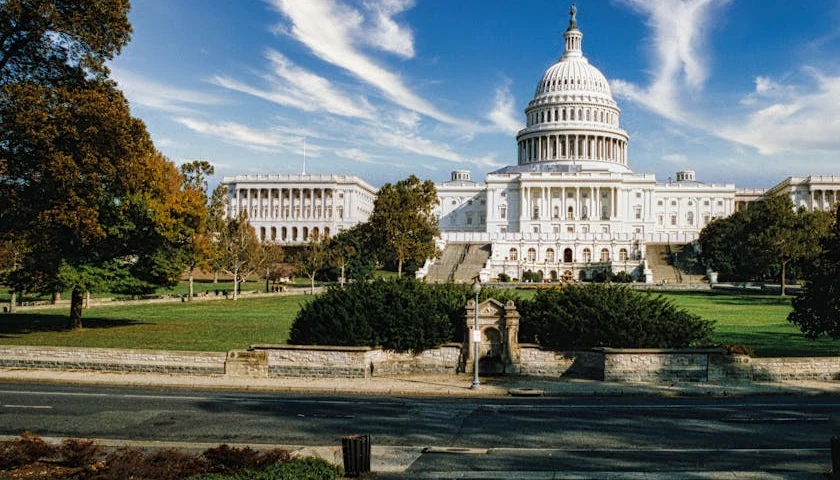by Micaela Burrow
A provision tucked away in Congress’ annual defense bill would allow federal judges and their household members to request content containing personal information be removed from websites, but some free speech advocates worry the rule could enable government censorship of online speech.
Section 5934 of the National Defense Authorization Act (NDAA), which the Senate is expected to vote on in December, bars the government from disclosing addresses, phone numbers, previous employment and other personal information belonging to federal judges or their close family members on government websites. It allows judges or their close family members to require non-government entities to remove that information from their websites unless the content pertains to “a matter of public concern.”
“It’s not that Congress can’t provide any protections here in this space, but they need to be very careful to make sure they are not overbroad,” Joe Cohn, legislative and policy director at the Foundation for Individual Rights and Expression (FIRE), told the Daily Caller News Foundation.
 The amendment follows high-profile threats to judicial officials, including a leak of Supreme Court judges’ addresses ahead of the landmark Dobbs v. Jackson Women’s Health case that may have facilitated violent acts, and stems from a congressional move to ensure judges’ safety. However, some free speech advocates warned to the DCNF that the language in the bill is so broad it could prevent the U.S. public from holding judicial leaders accountable.
The amendment follows high-profile threats to judicial officials, including a leak of Supreme Court judges’ addresses ahead of the landmark Dobbs v. Jackson Women’s Health case that may have facilitated violent acts, and stems from a congressional move to ensure judges’ safety. However, some free speech advocates warned to the DCNF that the language in the bill is so broad it could prevent the U.S. public from holding judicial leaders accountable.
The law aims to prevent instances such as the attempted assassination of Supreme Court Justice Brett Kavanaugh after pro-abortion organizations publicized the residences of conservative Supreme Court justices. Activists also demonstrated outside the justices’ homes against the expected final opinion of Dobbs v. Jackson Women’s Health case giving states the freedom to make abortion laws.
In a letter sent to Congress on Monday, 15 free speech organizations, including FIRE, urged Congress to slash Section 5934 from the NDAA.
“Section 5943 seriously infringes upon the First Amendment and impinges upon public oversight of ethics matters concerning the federal judiciary,” the advocates wrote.
The #NDAA internet censoring provision is set for Senate consideration this week. It allow federal courts to order anyone to remove info about fed'l judges from the internet. Let's hope @SenSchumer @LeaderMcConnell @SenJackReed @JimInhofe read our letter and cut section 5934. pic.twitter.com/j4uVIws7qg
— Daniel Schuman (@danielschuman) December 12, 2022
Although the bill carves out exceptions for information published in news stories or other speech in matters of public interest, the organizations warned that the rule could dissuade the organizations and other non-profit judicial oversight groups from publishing conflicts of interest for fear of violating the law.
For example, the public might have an interest in knowing a judge’s previous occupation or their spouse’s employer in the event one of the companies appears in a case before the judge, Cohn explained to the DCNF.
“While it is important to protect our judiciary, swinging the pendulum so far in that direction would leave citizens far less able to exercise their fundamental right to comment on and criticize government actors,” Ari Cohn, free speech counsel at TechFreedom, which also signed the letter to Congress, told the DCNF.
Democratic Sen. Bob Menendez of New Jersey countered “misinterpretations” of the Daniel Anderl Judicial Security and Privacy Act, the full name of the provision in the NDAA, arguing that the bill would simply help protect members of the judiciary from theft and threats of physical harm. The act was named in honor of Judge Esther Salas’s son, whose murder in 2020 in front of the Salas home sparked calls for greater judicial privacy protection, according to CNN.
“It [sic] no way does it impede critical efforts to uncover ethical conflicts for the spouses of federal judges, including necessary reporting by the press,” Menendez said.
“Journalists are not the only people who have free speech rights,” Joe Cohn, the policy director for FIRE, told the DCNF.
In addition, the present text mandates websites and platforms on written notice from the judge or judge’s close family member remove any post containing specified personal information, and ensure that the information does not get reposted elsewhere.
“This imposes a huge burden on websites, and would lead to the over-moderation of legitimate political discourse,” TechFreedom’s Ari Cohn told the DCNF.
The Senate Judiciary Committee did not immediately respond to the DCNF’s request for comment.
– – –
Micaela Burrow is a reporter at Daily Caller News Foundation.
Photo “Person Using Laptop” by picjumbo.com.





